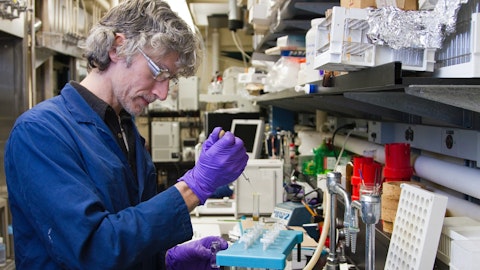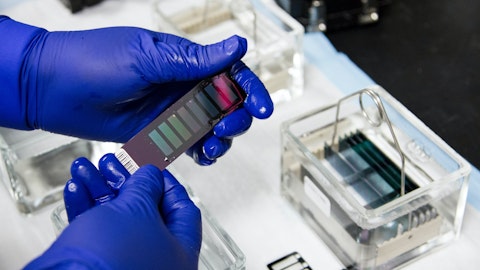Matthew Klein: Great. And then Tazeen regarding your second question in terms of potential further cost savings. Look as we talked about at the time of the CEO transition one of the things that we really wanted to focus on particularly as we were leading our studies and with the positive PKU data that we ultimately had we were in a position to start really focusing down and looking at opportunities to reducing our OpEx and reducing our cost. So, the team spent a lot of time in the spring looking into this. We obviously shared the reductions that we planned associated with the discontinuation of the preclinical gene therapy programs. Obviously that involved reduction in headcount and we made these decisions in late May which obviously gave a bit of a limited time in 2023 to realize an impact on cost savings which is why we’ve shared that we expect those changes in 2023 to have a greater impact than the impact of approximately $150 million in cost savings in 2024.
Of course we also are going to be in a position where we’re going to continue looking at the portfolio. Looking at opportunities to ensure that we’re advancing programs that have a reasonable return on investment as well as seeking opportunities to say when that’s not the case let’s look at cost savings. We’re looking at $940 million to $1 billion of revenue this year. We’re incredibly excited about that. We expect as we move our other programs forward and looking forward to the potential launch of the PKU program which we believe can be an over $1 billion market opportunity we’re really in position where we should be thinking about moving towards a breakeven point and ultimately one day in the future being profitable. And to do that we have to continue to be very thoughtful and strategic about our utilization of capital and how we think about OpEx when we think about program spend.
So, you’re correct. This is going to be something that we continue to do over time as we build the company forward.
Tazeen Ahmad: Thank you.
Operator: And thank you. And our next question comes from Paul Choi from Goldman Sachs. Your line is now open.
Paul Choi: Thank you. Good afternoon and congratulations on the quarter. My first question is on the commercial side with regard to Evrysdi. Your partner Roche reported the first sequential decline basically since the early days of the launch. I’m just wondering if you could maybe comment on market trends there given that your guidance embeds a milestone for 2023. My second question is also on Huntington’s. Just with regard to enrollment progress pending the discussion with the FDA and just how you’re factoring in the pace of enrollment contingent upon clarifying the clinical hold there? Thank you.
Matthew Klein: Thank you very much for your questions Paul. Let me take the second one first. So, in terms of enrollment look we’ve said all along that we were in a position to enroll this study outside the US, but that’s the benefit of having a global development organization that can run — get trials started and conduct trials in countries around the world. We have a study up and running in a number of countries in Europe as well as in Australia as well as you saw in Canada. And there is a great deal of enthusiasm in all of these countries amongst the physicians and the patient groups to participate in this trial. Obviously, the interim data readout showing that the drug to-date is shown to be safe well-tolerated and is having the desired pharmacodynamic effect has only heightened the interest.
We’re obviously very aware of the desire of patients in the US to participate in the study and physicians in the US to participate in the study. But I will say that we’re going to continue to enroll that study without doing anything to slow it down knowing that if we’re in the position to reopen the sites in the U.S. there will be opportunities for patients to participate. Regarding your second question on Evrysdi, Kylie do you want to take that?



